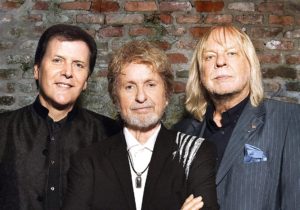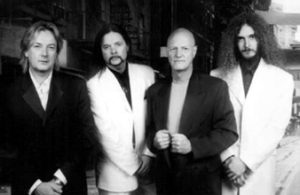 Don’t let the undercurrent of love and peace fool you. In Yes World, things are demonstrably “No.”
Don’t let the undercurrent of love and peace fool you. In Yes World, things are demonstrably “No.”
The blame, if we absolutely must assign it, falls on bassist Chris Squire’s shoulders for having the temerity to die. Being the keeper of the flame and the name, lo these many years, he had first right to use the intricate logo Roger Dean designed for the band so long ago.
Singer Jon Anderson, second in succession, hadn’t been with the group since the Symphonic Tour, a keyboard-free iteration which was developed after the release of the album Magnification. Other members of Yes’ first wave — Peter Banks, Tony Kaye, Tony O’Reilly –were either deceased or dispossessed. More well-known names to follow like Rick Wakeman, Bill Bruford, and Steve Howe did not have the ability to lay claim to the name unilaterally. Not like Jon Anderson.
 Prior to Squire’s death, Yes released two albums. Fly From Here was a reunion of the Drama-era lineup with The Buggles (with Trevor Horn handling production), featuring for the first and last time vocalist Benoit David (not David Benoit, as is often reported. Hard to make this stuff up.) Heaven and Earth found a new, new vocalist in the form of another Jon: Jon Davison. It was produced by Roy Thomas Baker who also produced Anderson’s late-’80s solo record 3 Ships.
Prior to Squire’s death, Yes released two albums. Fly From Here was a reunion of the Drama-era lineup with The Buggles (with Trevor Horn handling production), featuring for the first and last time vocalist Benoit David (not David Benoit, as is often reported. Hard to make this stuff up.) Heaven and Earth found a new, new vocalist in the form of another Jon: Jon Davison. It was produced by Roy Thomas Baker who also produced Anderson’s late-’80s solo record 3 Ships.
Another reunion of sorts occurred when Anderson joined forces with Wakeman and Trevor Rabin, the famed guitarist who brought the band to heights of popularity with Yes’ early-’80s albums, and they went on tour as ARW (or is it AWR).
Then there were the considerably frosty Rock and Roll Hall of Fame acceptance speeches, made memorable only by Wakeman’s wonderfully irreverent “ta’ hell with it” attitude throughout his speech. Apart from that, audiences were treated (?) to simulated camaraderie and injections of pomposity which may or may not have been attempts at humor. Scant days later, Anderson’s publicists announced that his faction would now be co-opting the Yes name, asserting that they were the rightful heirs.
 Of course, Yes from Earth One objected.
Of course, Yes from Earth One objected.
If this all sounds similar to you — apart from the longstanding Yes pose of members being perpetually at each others’ throats — it does offer parallels to bands with contentious splits and reformations, some of which actually don’t have Steve Howe in them. The Yes/Emerson Lake and Palmer/Buggles/King Crimson supergroup Asia was, for a period of time, toplined by singer John Payne. Prior to that, founding member Howe left, then founding vocalist John Wetton left, leaving Geoff Downes and Carl Palmer as the caretakers of the enterprise. Then the original lineup came back for a reunion tour and Payne was ousted. Briefly Payne took Asia newbies Guthrie Govan and Jay Schellen with him to form GPS. It did not last.
 Payne tried to reassert himself as the voice of Asia, seeing as how he actually held the position longer than Wetton did. Nostalgic fans, voting with their wallets, felt otherwise. Suddenly there were two: “Original Asia” and “Asia with John Payne.” The continent was unavailable for comment.
Payne tried to reassert himself as the voice of Asia, seeing as how he actually held the position longer than Wetton did. Nostalgic fans, voting with their wallets, felt otherwise. Suddenly there were two: “Original Asia” and “Asia with John Payne.” The continent was unavailable for comment.
The poster children for internecine dysfunction are Queensryche which split, for a time, between Tate-filled and Tate-free varieties. Geoff Tate, longtime lead singer claimed the name. The rest of the band, now featuring Crimson Glory vocalist Todd LaTorre, said in essence, “We outnumber you.” After a release from the former and two from the latter, a judge gave the final ownership of the brand to the rest of the band. Tate renamed his group Operation: Mindcrime after one of Queensryche’s most popular releases. Both entities continue to struggle to regain the level of recognition they once had and, as perplexing as it may sound, reunion rumors swirl.
 This leads us back to our warring proggers of Yes-terday. There is little question that, at some point, the two separatists will reemerge as one, either when it becomes financially beneficial to do so, or more cynically when someone else dies. In the meantime, the bands do damage to the brand that they have cultivated for decades, held aloft on a thin slipstream of high-mindedness, new age positivity, and the goodwill of a most tolerant fanbase.
This leads us back to our warring proggers of Yes-terday. There is little question that, at some point, the two separatists will reemerge as one, either when it becomes financially beneficial to do so, or more cynically when someone else dies. In the meantime, the bands do damage to the brand that they have cultivated for decades, held aloft on a thin slipstream of high-mindedness, new age positivity, and the goodwill of a most tolerant fanbase.





Comments